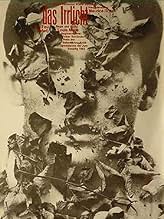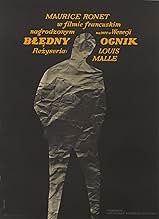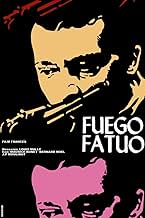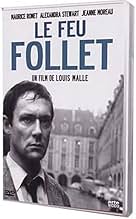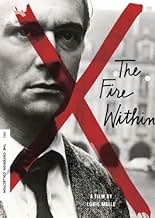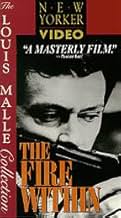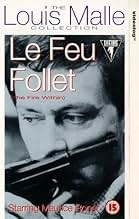AVALIAÇÃO DA IMDb
7,8/10
11 mil
SUA AVALIAÇÃO
Alain Leroy, deprimido, deixa a clínica onde foi desintoxicado. Ele encontra amigos, conhecidos e mulheres, tentando encontrar uma razão para continuar a viver. Será que isso o ajudará?Alain Leroy, deprimido, deixa a clínica onde foi desintoxicado. Ele encontra amigos, conhecidos e mulheres, tentando encontrar uma razão para continuar a viver. Será que isso o ajudará?Alain Leroy, deprimido, deixa a clínica onde foi desintoxicado. Ele encontra amigos, conhecidos e mulheres, tentando encontrar uma razão para continuar a viver. Será que isso o ajudará?
- Direção
- Roteiristas
- Artistas
- Prêmios
- 2 vitórias e 2 indicações no total
René Dupuy
- Charlie
- (as René Dupuis)
- Direção
- Roteiristas
- Elenco e equipe completos
- Produção, bilheteria e muito mais no IMDbPro
Avaliações em destaque
"The Fire Within" (French, 1963): Directed by Louis Malle, scored by Eric Satie. This is a perfect visual reason to use black and white with tons of gray. It is two days in the life of a young, popular man who has returned to his acquaintances, friends and ex-lovers, after vanishing into a program for alcoholics
a program he found comforting, and did NOT want to leave. He searches through his relationships for a reason to continue his life, whether as-is or anew
but overriding any thoughts of the future is his current state of total depression. His friends continued their lives during his absence, they continue their fast-paced, challenging repartee during his visits, and they will clearly continue after his leaving. "The Fire Within" is a quiet, observational film, interrupted only for conversations that seem to have substance, yet offer no solutions. It has one goal, and meets it very well.
One of the triumphs of the otherwise often overrated nouvelle vague,Louis Malle's adaptation of a Drieu de la Rochelle has not aged bit.Thanks to Maurice Ronet ,who portrays a suicidal man,probably the most beautiful performance of this kind.The movie is nothing but a long wandering in a mental hospital,in the Parisian bistros,in the posh world where an Antonioniesque bourgeoisie is killing time (see Alexandra Stewart's character).If I mention Antonioni,it''s not by chance ;actually Malle succeeds here where Antonioni only partially does.The difference ,I think,lies in the fact that we have here a human being,made of flesh and blood,who exists,and I would like to point out once again what a great actor the late Maurice Ronet was.Eric Satie's music perfectly captures the doomed atmosphere.This is arguably Louis Malle 's finest,one of the rare movies which achieve the delicate balance between the strong screenplay and the "liberties" dear to the new wave creators. Yes the new wave did produce great movies:"la tête contre les murs " (Franju)"Cléo de 5 à 7" (Varda)"Lola" (Demy)and this one are jewels on its crown.
One extraordinary feature of this film is what I would call a "filter". Right from the start, the viewer knows that Alain is hurriedly (yet half-heartedly) searching for something that would give him the will to live, otherwise he will commit suicide. This extremely simple premise leads to extraordinary effects: the everyday happenings, which would seem neutral or even pleasant in any other circumstance, now fill us with disgust. Through the filter of Alain's eyes, we perceive the everyday reality as hopeless and empty of any worthwhile purpose. The author's message: you should apply that filter to your own life. But who has the guts to do it? I know I don't.
A bleak character study of a recovering alcoholic who has lost all hope and decides to kill himself. The film follows him over the course of a couple of days as he wanders about the streets, running into and saying goodbye to former acquaintances. One senses that he's trying out of a last ditch sense of desperation to tease out of these people some hint of how they manage to find things worth living for, but their secrets remain elusive. He carries out his plan, and the film makes the rather unsettling suggestion that some never find anything worth living for.
Not a comforting thought for those who struggle through depressions of their own and look to the positive messages so often found in films to buoy their hopes. But then this movie is not intended to be comforting. It's quiet, lonely, and depressing, but it's also a bit refreshing that director Louis Malle resists a happy resolution and instead stays committed to depicting life the way it actually plays out for some rather than the way the movies would have us believe it does.
Grade: A
Not a comforting thought for those who struggle through depressions of their own and look to the positive messages so often found in films to buoy their hopes. But then this movie is not intended to be comforting. It's quiet, lonely, and depressing, but it's also a bit refreshing that director Louis Malle resists a happy resolution and instead stays committed to depicting life the way it actually plays out for some rather than the way the movies would have us believe it does.
Grade: A
THE FIRE WITHIN is a drama about a former alcoholic, who is at the crossroads between life and death in a state of a deep depression. It is based on the novel "Will O' the Wisp" by Pierre Drieu La Rochelle.
Alain, a recovering alcoholic at a rehabilitation clinic in Versailles suffers with a depression. He often thinks about suicide, but still tries to find some valid reasons for living. He is in complete contrast with a behavior of his friends, which further enhances his internal conflict...
Mr. Malle gently touches sore points of a depressed man. His hero is empty and defeated man, who is trapped between a drunken past and an uncertain future. Many of the protagonists, who are full of compassion and love, going through his frustrating life. He's a lost soul, who can not let go of his depressive everyday life. However, a man, without an imagination and love, must find his own peace and certainty. A recovery from alcohol is an ironic view of a collapsed life.
Regardless of a state of his mind and heart, his tragic appearance is not quite clear. This is a kind of flaw of this film, because the main protagonist has condemned himself to a tragic end, before he has considered any options. An authentic scenery emphasizes his escape from any opportunities in life.
Maurice Ronet as Alain Leroy has offered a convincing performance. He is a lonely man who helplessly wanders...search, and then run away from love and certainty.
Life is a kind of agony in this case.
Alain, a recovering alcoholic at a rehabilitation clinic in Versailles suffers with a depression. He often thinks about suicide, but still tries to find some valid reasons for living. He is in complete contrast with a behavior of his friends, which further enhances his internal conflict...
Mr. Malle gently touches sore points of a depressed man. His hero is empty and defeated man, who is trapped between a drunken past and an uncertain future. Many of the protagonists, who are full of compassion and love, going through his frustrating life. He's a lost soul, who can not let go of his depressive everyday life. However, a man, without an imagination and love, must find his own peace and certainty. A recovery from alcohol is an ironic view of a collapsed life.
Regardless of a state of his mind and heart, his tragic appearance is not quite clear. This is a kind of flaw of this film, because the main protagonist has condemned himself to a tragic end, before he has considered any options. An authentic scenery emphasizes his escape from any opportunities in life.
Maurice Ronet as Alain Leroy has offered a convincing performance. He is a lonely man who helplessly wanders...search, and then run away from love and certainty.
Life is a kind of agony in this case.
Você sabia?
- CuriosidadesFor the first two days, filming was done in color. However, director Louis Malle realized that this was a distraction from the story, so he decided to film in black-and-white. An assistant also later declared that the shooting atmosphere on the set was rather gloomy.
- Erros de gravaçãoAs Alain walks on the streets of Paris, the crew (pushing the dolly) is visible on the shop windows he passes by.
- Citações
Alain Leroy: I'm killing myself because you didn't love me, because I didn't love you. Because our ties were loose, I'm killing myself to tighten them. I leave you with an indelible stain.
- Trilhas sonorasTrois Gymnopédies
Written by Erik Satie
Principais escolhas
Faça login para avaliar e ver a lista de recomendações personalizadas
- How long is The Fire Within?Fornecido pela Alexa
Detalhes
- Data de lançamento
- País de origem
- Central de atendimento oficial
- Idioma
- Também conhecido como
- The Fire Within
- Locações de filme
- Empresa de produção
- Consulte mais créditos da empresa na IMDbPro
- Tempo de duração1 hora 48 minutos
- Cor
- Mixagem de som
- Proporção
- 1.66 : 1
Contribua para esta página
Sugerir uma alteração ou adicionar conteúdo ausente

Principal brecha
By what name was Trinta Anos Esta Noite (1963) officially released in India in English?
Responda
![Assistir a Bande-annonce [OV]](https://m.media-amazon.com/images/M/MV5BODdiNzczOTktMmMxMC00ZGQ0LTg4YWItZWEzN2FkZTViODk1XkEyXkFqcGdeQXRyYW5zY29kZS13b3JrZmxvdw@@._V1_QL75_UY281_CR0)
